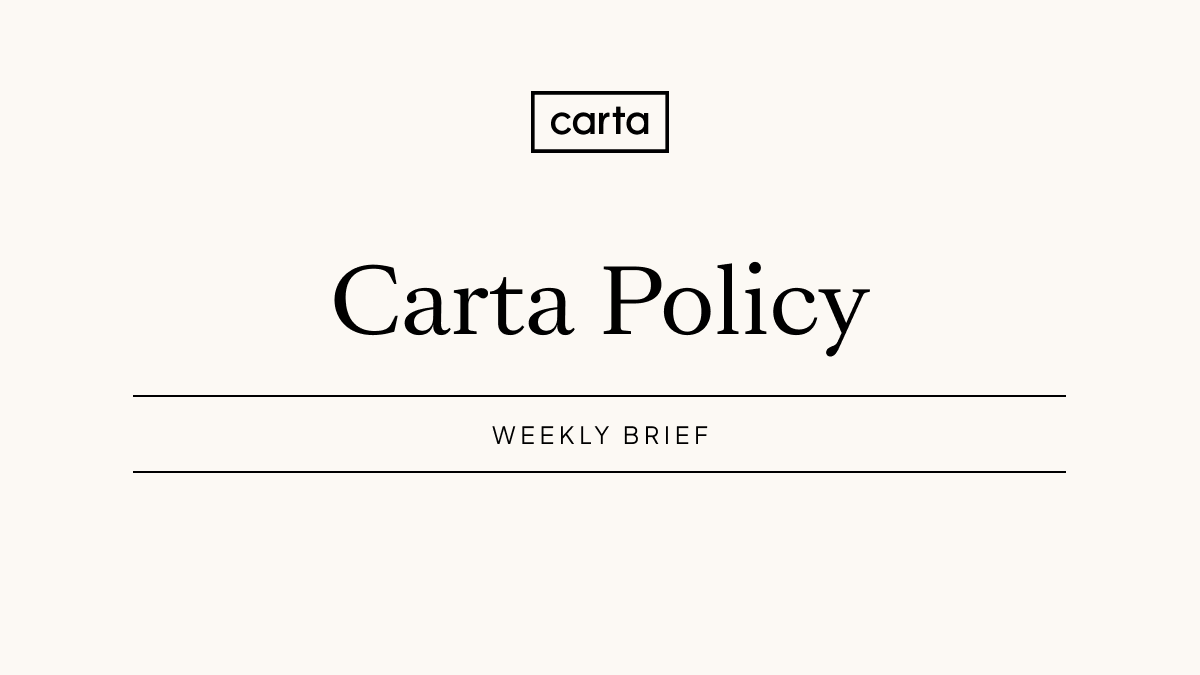Topline
-
Push for markup slows tax bill’s momentum
-
Carta unveils VC regulatory playbook
-
Court hears arguments in lawsuit to vacate SEC’s private fund adviser rules
-
Treasury to propose AML rule for investment advisers
-
SEC adopts amendments to enhance private fund reporting
-
House China Committee publishes report on link between U.S. VC firms and China
-
House Financial Services Committee to discuss CTA next week; Carta hosting event to showcase efforts to simplify CTA compliance
It’s Super Bowl weekend. Are you ready for it? This lifelong Kansas Citian, a Swiftie and our very own Lindsay Fraser’s grandfather, certainly is!
Push for markup slows tax bill’s roll
Some Senate Republicans are doubling down on the importance of marking up the House-passed bipartisan tax package. The package’s business tax provisions—full expensing of R&D, accelerated bonus depreciation, and net interest expensing—retain strong bipartisan support. Although Senators have signaled that any additional changes would be bipartisan provisions, that process will slow the bill’s progress and ultimately result in it being sent back to the House for another vote. The bill is not necessarily in jeopardy, but delays never help, so industry—and Carta—will stay engaged to push the policy forward.
What’s next: The Senate Finance Committee has not yet scheduled a markup, and the chamber is now in recess until the week of Feb. 26. Government funding is (again) set to expire in early March, which will begin to eat away at the Senate calendar, but also could give the tax deal a ride to passage if Republicans’ concerns are assuaged in time.
Off the Hill, this murky outlook is contributing to growing unease among taxpayers as filing season rolls on. Amy Miller, Carta’s director of public policy, highlighted these impacts for Bloomberg Tax, explaining how the package’s state of limbo makes it difficult for companies to conduct tax planning and decide how to invest in research and technology in the coming years.
Call to action
Carta sent a letter to Senate leadership in support of restoring full R&D expensing. Join the effort by contacting your U.S. Senators to let them know that R&D matters to the innovation community. Download the email template here.
New from Carta: VC Regulatory Playbook
The private market regulatory environment is shifting, and even the most experienced fund managers have a hard time keeping up. A common piece of feedback we hear from the venture community is that it would be helpful to have a guide of the venture capital regulatory landscape—a playbook if you will.
So we created one.

The VC regulatory playbook outlines the regulatory landscape, details compliance requirements, and provides additional considerations for fund managers as they launch and grow their firms.
Fifth Circuit questions SEC authority over private fund advisers
The Fifth Circuit heard oral arguments this week in the lawsuit to vacate the SEC’s private fund adviser rules. While the private funds industry has challenged the rules on a number of grounds, most of the discussion focused on the Commission’s authority to promulgate rules governing the relationship between private funds and private fund investors.
-
The SEC largely relied on the Dodd-Frank Act, which gave the Commission authority to impose disclosure requirements around advisory relationships and conflicts. While the SEC interprets this authority as applying to all investors, the industry argued it is geared toward protecting retail investors, not sophisticated investors in private funds.
-
The SEC also relied on its general anti-fraud authority under Section 206(4) of the Investment Advisers Act, though the court seemed skeptical as to whether there was a factual basis to justify a regulatory overhaul of the private funds industry.
Possible outcomes: While oral arguments are not dispositive, they do provide some insight into how a court may proceed. And the Fifth Circuit has generally been more hostile to the regulatory state. Given the court’s skepticism over the scope and basis for authority, it seems likely portions of the rule may be struck down or sent back to the SEC. Such an action would have broader ramifications for the Commission, as it has relied on the same authorities for a number of controversial proposals, including the outstanding predictive analytics and ESG proposals.
What’s next: The parties have asked the panel for a decision by the end of May (though the court is not bound by this timeline). The non-prevailing party will then have an opportunity to request the Fifth Circuit rehear the case en banc or appeal to the Supreme Court. The timing of an ultimate resolution is uncertain and may stretch beyond September 2024, when funds with over $1.5 billion in AUM are required to start complying with certain aspects of the rule. Stay tuned.
Treasury to propose AML rule for investment advisers
Treasury Secretary Janet Yellen announced that the Treasury Department will propose a rule that would apply anti-money laundering (AML) restrictions to investment advisers. Yellen commented that the rule would help replace the current “patchwork” system of regulation, noting that there are currently gaps that allow illegitimate or illicit investors to access the financial system through an investment adviser that isn't required to inquire into their source of wealth. While no proposal has been released, FinCEN could use its 2015 proposal as a baseline, which would require investment advisers to implement a system of internal controls, designate an AML officer, and conduct independent testing, among other requirements.
Why it matters: SEC-registered investment advisers (RIAs), including private fund advisers, will likely be covered by these anticipated rulemaking efforts, though FinCEN may go further and scope in state-registered and exempt reporting advisers as contemplated in 2015. While many investment advisers have some form of KYC/AML program, a formalized requirement will add to the increasing regulatory obligations and oversight of the private fund industry.
House China Committee publishes report on link between U.S. VC firms and China
The House Select Committee on the Chinese Communist Party published a report on venture capital’s role in advancing China’s growth in two key technology sectors: artificial intelligence (AI) and semiconductors. The report examined the activities of five U.S.-based venture capital firms and concluded these investments have helped fund the development of Chinese artificial intelligence and technology firms now being used by the ruling Communist Party for malicious purposes. The report alleges that the technology has been used for purposes such as spying on Chinese citizens and “undermining American leadership.”
Why it matters: The report is likely to re-ignite calls to pass legislation to impose an outbound investment screening process. There has been bipartisan support for the goal of screening outbound U.S. investment into China following Biden’s executive order last year, but there is disagreement on how it is done. The Senate has been proposing a more permanent and broad screening approach while HFSC Republicans have been advocating for a more tailored mechanism.
SEC adopts amendments to enhance private fund reporting
The SEC and CFTC jointly adopted amendments to Form PF, the confidential reporting form for certain SEC-registered private fund advisers, largely applicable to hedge and private equity funds. The amendments are designed to enhance the ability of the Financial Stability Oversight Council (FSOC) to monitor and assess systemic risk and to bolster the SEC’s oversight of the private markets.
-
While the amendments largely focus on enhancing reporting requirements for large hedge funds around market risk, performance, and strategy, they will also add additional complexity to how private equity funds report information related to master/feeder and parallel fund structures.
-
Republican commissioners at both agencies cautioned the new Form PF reporting requirements exceed the needs of FSOC systemic risk monitoring and will be used to assist the SEC in ramping up its regulation of private markets, in addition to data protection concerns.
Why it matters: This action continues the SEC’s expanded scrutiny and regulatory focus on the private markets. In addition to Form PF amendments adopted last, these changes will add to other new compliance obligations that impact how private funds need to report information to their regulators and investors, including quarterly statement disclosures under the private fund adviser rule and performance reporting under the marketing rule. Not to mention a host of other proposals that would add new compliance requirements.
Carta Innovators Summit
On February 13, Carta is hosting its annual Carta Innovators Summit: a free, virtual event celebrating innovators and innovation in all forms. Hear from the innovators sparking change as they discuss building lasting LP relationships, innovative approaches to GTM, navigating term sheets and deal dynamics, and much more.

House Financial Services Committee to discuss CTA next week; Carta to showcase efforts to simplify compliance
Next week, the House Financial Services Committee (HFSC) is hosting an oversight hearing of the Financial Crimes Enforcement Network (FinCEN) and the Office of Terrorism and Financial Intelligence. The Corporate Transparency Act (CTA) is likely to be a hot topic following increasing pressure from House and Senate Republicans requesting a delay in the implementation of new beneficial ownership information (BOI) reporting requirements for small businesses until their concerns are addressed.
Carta steps in to aid the CTA compliance with free tool
For a step-by-step guide to understanding CTA compliance, download Carta's CTA compliance checklist here.
Carta also makes it easy for you to complete and submit your company’s BOI report for FREE. It only takes a few clicks and we’ll ensure you file on time.
Join us on March 7, 2024 at 10am PT / 1pm ET for a first look at this filing solution and a live Q&A.

News to know
-
SEC issues new marketing rule FAQs around private fund performance. The FAQ describes how private funds should present gross and net performance on a levered and unlevered basis, incorporating components from the private fund adviser rule’s quarterly statement disclosure.
-
Republicans attempt to block predictive data analytics rule. A new bill introduced by Sens. Ted Cruz and Bill Hagerty would prevent the SEC from finalizing a July 2023 proposed rule to restrict the use of predictive data analytics by broker-dealers and investment advisers. The lawmakers cautioned that the rule is overly broad and would significantly hinder how industry uses technology in trading and client interactions.
-
FTC criticizes Microsoft layoffs as merger challenge continues. Microsoft announced nearly 2,000 layoffs in late January, with a significant portion coming from the newly acquired Activision Blizzard. The Microsoft-Activision deal was proposed in January 2022 and closed in October 2023, but the FTC is appealing a lower court’s decision in favor of Microsoft and cited the newly announced layoffs as contradictory to Microsoft’s claims earlier in the proceedings.
-
Treasury previews returns on IRS investments. New analysis from the Treasury Department predicts that the additional IRS modernization funding enacted via the Inflation Reduction Act will increase revenue by up to $561 billion from 2024-2034. If the funding is renewed before it expires, the revenue estimate would rise to $851 billion over the same window. The IRS funding bump has been a political lightning rod since its award, with Republicans repeatedly attempting to clawback parts or all of the sum.
-
Yellen presses Congress on stablecoins. Treasury Secretary Janet Yellen, testifying on Capitol Hill this week in her capacity as chair of the Financial Stability Oversight Council (FSOC), reiterated that stablecoins should be subject to a regulatory framework. She noted that the appropriate stablecoin-specific framework may differ—potentially on capital standards—from the regulatory structure applied to banks. Yellen’s remarks are timely as lawmakers are close to releasing a revamped stablecoin bill.
Upcoming events
-
Regulating AI: A Conversation with Gary Gensler - February 13 at 9:10 a.m. PT / 12:10 p.m. ET
-
Carta Innovators Summit - February 13 at 10:00 a.m. PT / 1:00 p.m. ET
-
Yale School of Management Fireside Chat with Gary Gensler - February 13 at 1:00 p.m. PT / 4:00 p.m. ET
-
Peterson Institute for Economics: Artificial Intelligence and Trade: Will ChatGPT Handle Your Supply Chains? - February 14 at 6:00 a.m. PT / 9:00 a.m. ET
-
House Financial Services Committee: Oversight of the Financial Crimes Enforcement Network (FinCEN) and the Office of Terrorism and Financial Intelligence (TFI) - February 14 at 7:00 a.m. PT / 10:00 a.m. ET
-
CFTC Commission Open Meeting - February 15 at 9:30 a.m. PT / 12:30 p.m. ET
-
CFTC Commissioner Pham Commissioner Caroline D. Pham will participate on a panel titled “ AI and Data Frameworks: Main Priorities Ahead in the Financial Sector” - February 21 at 6:10 a.m. PT / 9:10 a.m. ET
-
SEC Small Business Capital Formation Advisory Committee Meeting - February 27 at 7:00 a.m. PT / 10:00 a.m. ET
-
Corporate Transparency Act: Simplify Filing with Carta - March 7 at 10:00 a.m. PT / 1:00 p.m. ET

